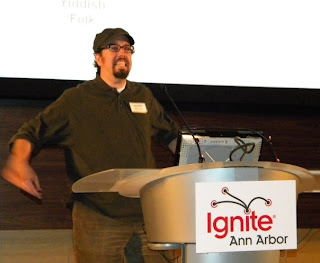'Music is the pulse of Jewish spirituality – song charts the biorhythms of the Jewish soul.' - England's Chief Rabbi, Sir Jonathan Sacks (from the Jewish Music Institute)I received an email today from a relative who recently had very positive Jewish experience (musical and spiritual) with
Rabbi Sigal Brier.
"While at Kripalu [Yoga Center] Dec. 24 and and 25, [we] participated in a kind of Cabbalistic sing-a-long led by Rabbi Sigal. We really enjoyed chanting with this very personable, interesting woman (and about 40 other people in the group). This was a very unique musical experience for me. It was so repetitious that I actually felt the Hebrew words flow (so different from my usual tortuous pronunciations!) and as the melody changed, got faster or quieter, the nuances of the words changed, too."
I've never had an experience like this. I daven in a minyan a couple of times a week and sometimes have good prayer days when I feel a real connection and sometimes I don't. I know that my experience is common and that a lot of Jews actively seek more 'spirituality.' I only put it in quotes because I really don't know what the word means. What is a mystical experience? What does it mean to seek a imminent relationship with God? That's beyond my ability to really understand.
But Judaism has always had seekers, some following traditional paths such as the Chassidim or
neo-chassidic (e.g.
Jewish Renewal). Some follow more exotic paths. But all of these paths seem to have musical accompaniment. The practice of niggun, or wordless melody, for example, is central to Chassidic practice and it's derivatives. DovBear Pinson, a Chassidic scholar,
describes the niggun's connection to spirituality in this way...
"A wordless tune--as is much of Jewish mystical song, particularly Chassidic--is the way two individuals can communicate on a soulular transcendent level. Any breakdown in the verbal communicated mode can be repaired by creating a conduit that transcends words. When a person feels alienated from his Source, or for that manner, from his fellow man, a wordless tune which exists on a realm that defies distinctions, separations, and disharmony, is the most fitting remedy, causing a unity of souls."
This understanding of creating a conduit seems to capture what Rabbi Sigal tries to achieve with her chanting groups. According to her website, Rabbi Sigal is a
Reconstructionist rabbi with a focus on what she calls Integrated Judaism
"the integration of Jewish wisdom, traditions, and practices, with other holistic wisdom and practices. The foundational idea is the awareness of oneness, wholeness, and unity." While I've never heard the term "Integrated Judaism" (I think it's a bit of a Rabbi Sigal trademark), I've seen concepts like this floated around before under the rubric of '
JewBu,' or Jewish Buddhist. One of the best Conservative rabbi's I've had was a bit of JewBu. He'd studied Buddhism for a while before entering seminary and becoming a Rabbi. While he left any specific Buddhist practices behind, his religious sensibility was an interesting mix. He could balance a sense of awe in the sublime with an earthy sense of daily life in a way I don't see in many other Conservative rabbi's. My wife misses his sermons terribly.
I was interested to see that Rabbi Sigal is, to a degree, neo-Chassidic and explicitly references and teaches Kabbalah, the Jewish mystical tradition, as well as Yoga and Eastern "holistic wisdom and practices." The Kabbalah connection is something I expect more from the Jewish Renewal community than the Reconstructionist community, but Rabbi Sigal is clearly setting her own pace. Listening to the
recording samples she offers on her website (she has a number of CDs for sale) I hear more Eastern and Middle-eastern music than niggun melodies, but I understand the connection.
I don't have any personal experience with Rabbi Sigal, and am always a bit worried when folks feel the need to supplement Judaism in the way she does, but did want to pass along the my relative's recommendation. If you're in the seeking a spiritual or mystical connection, then the musical traditions of the Chassidic and neo-Chassidic approaches may have value. If you want a less traditional, more yoga flavored version, then Rabbi Sigal may have something to offer.
Related posts:
Temple "Coming Home"







